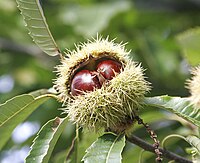
Photo from wikipedia
Effects of spraying over apple trees (Malus domestica; ‘Topaz’) with methyl salicylic acid (MeSA) and SA during fruit maturation were investigated for quality parameters (weight, firmness, hue angle, red blush,… Click to show full abstract
Effects of spraying over apple trees (Malus domestica; ‘Topaz’) with methyl salicylic acid (MeSA) and SA during fruit maturation were investigated for quality parameters (weight, firmness, hue angle, red blush, yield) and phenolic profile of the peel and pulp (HPLC–mass spectrometry). These treatment effects were also investigated for activities of the phenylpropanoid pathway enzymes phenylalanine ammonia-lyase, chalcone synthase and isomerase (combined), and flavanone-3β-hydroxylase. The MeSA and SA treatments resulted in poor fruit peel coloration, with higher hue angles and 20% and 10% lower red blush, respectively. Anthocyanin levels were also significantly lower (56%) for MeSA treatment. MeSA stimulated activities of phenylalanine ammonia-lyase and chalcone synthase/isomerase, which resulted in higher levels of flavanols (to 34%), flavonols (to 33%), and hydroxycinnamic acids (to 29%), versus control. Therefore, while these salicylate treatments improve levels of some beneficial polyphenols, they also have negative effects on the external quality characteristics of the fruit.
Journal Title: Plants
Year Published: 2021
Link to full text (if available)
Share on Social Media: Sign Up to like & get
recommendations!